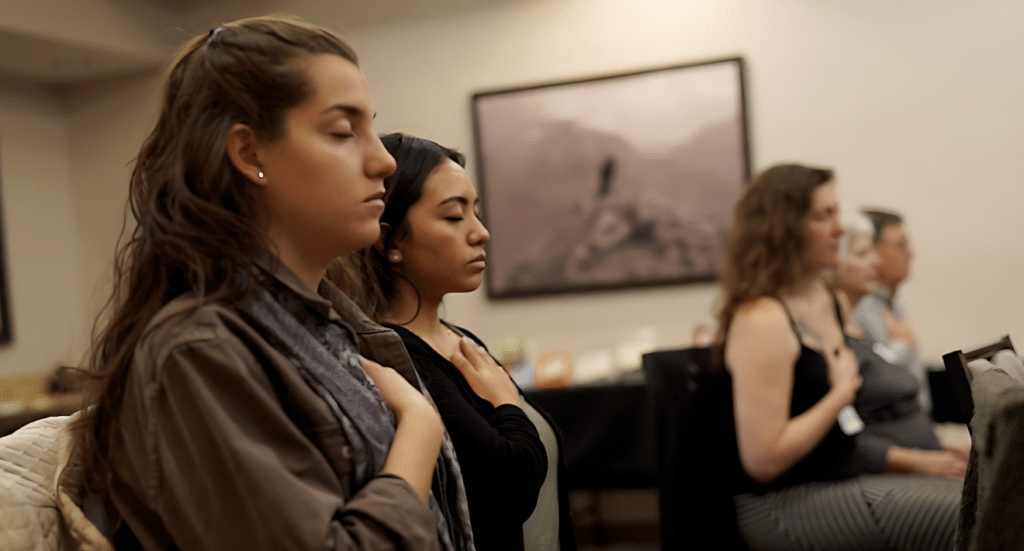By: Maha Khan, ISH and CO
Against the backdrop of modern wellness practices, IamHeart introduces Heart Rhythm Meditation (HRM) as a groundbreaking approach that merges ancient wisdom with scientific research. Developed by Puran and Susanna Bair in response to a charge from their teacher, Pir Vilayat Khan, HRM integrates ancient Sufi teachings with modern science. This method is now more accessible than ever with the launch of a new app, making it a timely solution for today’s mental health challenges.
The launch of IamHeart’s innovative app aims to assist many in their meditative journeys.
The app features HRV graphing and progressive meditation practices with clear instructions. Unlike traditional mindfulness apps, the Breath and Heart app directs its attention towards the concept of “heart” in a holistic manner—embracing its physical, emotional, and symbolic dimensions, as well as its inherent values and intuitive significance. The app provides “moments,” enabling users to engage in brief sessions on different topics with various teachers for different durations. Additionally, the “series” section covers full breathing, heartbeat awareness, and emotional mindfulness. Advanced levels explore diverse breathing patterns, meditation techniques, personality archetypes, and the physiological benefits of HRV modulation.
“Our goal with the app is to empower individuals from diverse backgrounds to achieve centeredness and resilience through the practice of HRM,” says the chief executive at Iamheart. “The accessibility of the app allows us to reach a broader audience, providing support during these challenging times.”
HRM distinguishes itself from other meditation techniques by its measurable physiological benefits. Unlike many practices that focus on the normal breath, HRM emphasizes deep, slow, full breaths and focuses on the heart, likely stimulating the vagus nerve with greater intensity. The study examined HRM’s effects on vagal activity, as measured by heart rate variability (HRV), and its impact on participants’ well-being. Well-being scores increased noticeably for those who practiced more than ten minutes per day. Qualitative data indicated positive effects of HRM on stress and well-being, a more expanded sense of self, and increased awareness of the body-heart-emotional connection, underscoring HRM’s role in emotion regulation.
HRM is more than just a meditation practice; it’s a pathway to building deep, spiritual communities. Since the 1990s, IamHeart has fostered a global community of practitioners who support each other’s growth and well-being. “In 1989, Puran and Susanna founded the Institute for Applied Meditation on the Heart, teaching in-person and online classes, leading group and individual retreats, hosting seminars, and speaking at conferences,” as Gerred Clarke, the chief executive at IamHeart revealed. “Together, they have authored four books and trained thousands of practitioners, teachers, mentors, healers, and retreat guides around the world,” shared Puran.

Photo Courtesy: iamHeart
For centuries, breath has been utilized in yoga and meditation to manage stress, reduce heart rate, and promote well-being. These practices have gained popularity in the West, prompting scientific research into their benefits. Influenced by Jon Kabat-Zinn, mindfulness, focusing on breath, has been integrated into medical settings. Studies on mindfulness-based stress reduction (MBSR) show positive effects on stress reduction and quality of life. Many meditation forms use breath for concentration, with research indicating that slow, deep breaths significantly impact the parasympathetic nervous system, affecting HRV, emotional regulation, and self-awareness. Studies suggest that practices like Heart Rhythm Meditation (HRM), emphasizing heart-focused, full breathing, enhance vagal tone and overall well-being, contributing to research on contemplative practices’ effects on health and quality of life.
“Our approach to HRM is rooted in centuries-old practices from mystical traditions,” explains Puran, co-founder of IamHeart. “We’ve integrated these ancient techniques with modern scientific insights, validating HRM’s efficacy in promoting optimal well-being.
IamHeart aims to expand its research initiatives to further explore HRM’s global impact on mental health and community resilience. “Our goal is to empower individuals from diverse backgrounds to achieve centeredness and resilience through the practice of HRM,” Gerred Clarke, the Executive Chief affirms. For more information on HRM, the new app, and IamHeart’s initiatives, visit their official website.
Published By: Aize Perez

